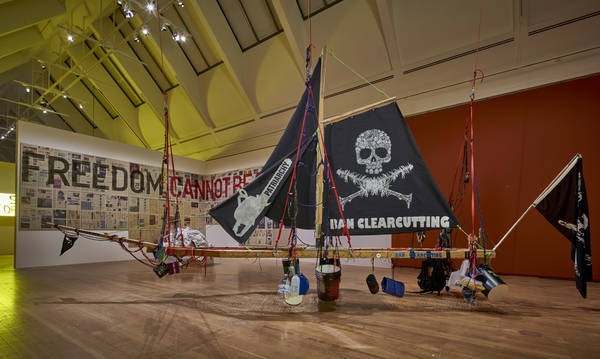Power To The People
Political Art Now
21 Mar - 27 May 2018

Political Art Now
21 March – 27 May 2018
The Schirn is presenting an extensive exhibition on the political art of the present day. Based on a wide variety of different media, such as installations, photography, drawing, painting, and film, Power to the People: Political Art Now takes stock of contemporary positions that can be read as seismographs of political activity.
Democracy appears to be in crisis, the era of post-democracy has already dawned. The symptoms are manifold: populist leaders, fake news, autocratic backlash, totalitarian propaganda, and neoliberalism. For some time, however, society has also been experiencing the path of the art’s return to the political—a re-politicization is palpable. Images of demonstrations in the media have shaped public perception in recent years: waving flags, posters, or banners on streets and squares, at the Women’s March, in anti-Brexit campaigns, or in Occupy actions. There have been renewed waves of protest relating to very diverse contexts, countries, and political systems. This has affected artists as well. They create works that they regard as instruments of critique and explicitly motivated by politics.
WITH WORKS BY HALIL ALTINDERE, PHYLLIDA BARLOW, GUILLAUME BIJL, JULIUS VON BISMARCK, ANDREA BOWERS, OSMAN BOZKURT, TOBIAS DONAT, SAM DURANT, OMER FAST, MARK FLOOD, FORENSIC ARCHITECTURE, DANI GAL, KATIE HOLTEN, ADELITA HUSNI-BEY, HIWA K, EDGAR LECIEJEWSKI, JONATHAN MONK, AHMET ÖĞÜT, RICARDA ROGGAN, MARINELLA SENATORE, RIRKRIT TIRAVANIJA, NASAN TUR AND JENS ULLRICH
The exhibition Power to the People focuses on fundamental questions and examinations of the phenomena of and potential for political involvement. Stances are called into question, forms of protest depicted, and new stages of de-democratization considered. In doing so, the mechanisms and logic of political participation are addressed, even beyond concrete concerns. Through bringing together artistic positions from all manner of countries—from Germany, England, Belgium, and the United States to Turkey, Israel, or Libya—it hence encourages reflection not least on what political participation can look like and the consequences it entails in each case.
